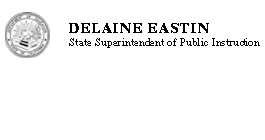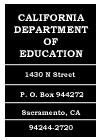Nonpublic Schools/Agencies Legal Advisory 03/17/99


Official Letter
Official Letter
Date: March 17, 1999
To: All County
and District Superintendents
All
Special Education and SELPA Directors
From: Michael E. Hersher, General Counsel
Barry
A. Zolotar, Deputy General Counsel
Legal
and Audits Branch
Subject: Legal Advisory - Non-public School/Agency (NPS/A) Waivers and Retroactive Reimbursement to Parents who have made Unilateral Placements in an NPS/A prior to July 1, 1998 or, on or after July 1, 1998
In this advisory, the California Department of Education (CDE) addresses the situation in which a parent has unilaterally placed a child in an uncertified private school or contracts with an uncertified related services provider prior to July 1, 1998, or on or after July 1, 1998, (without the consent of an IEP team), and ultimately reaches a mediated settlement agreement concerning retroactive reimbursement to the parent without a certification waiver or contract with the private provider.
The CDE will discuss the relationships among (a) mandated contracting for private school or agency services, (b) state certification requirements, (c) the rights of parents to have their unilateral placement costs retroactively reimbursed by a school district in accordance with a mediated settlement agreement, (d) a school district's right to reimburse parents' costs directly, and (e) state waiver requirements [A reference to a school district includes county offices of education and special education local plan areas (SELPAs).] .
Education Code (EC) Section 56365 authorizes the expenditure of state and federal funds when private services are necessary to provide a free appropriate public education (FAPE) to a student with exceptional needs. Situations arise in which parents determine that the only way their child can receive a FAPE is to make a private placement without the consent of a school district in a private school, or to contract for related services with a private agency (i.e., psychologist, social worker, physical therapist, assistive device consultant, etc.). Typically, parents pay for these services themselves. Prior to the 1997 amendments to the Individuals with Disabilities Education Act (IDEA) (20 U.S.C. § 1400 - 1485), the United States Supreme Court recognized that parents had the right to make such "unilateral" placements under IDEA, but at their own risk [Burlington School Committee v. Depart. of Educ., 471 U.S. 359, 368; 105 S.Ct. 1996, 2002 (1985). Carter v. Florence County School Dist. 4, 950 F.2d 156, 163 (4th Cir. 1991), aff'd., 114 S. Ct. 361, 365 (1993).] .
If the parents request a school district to reimburse them for tuition or related services costs and the school district refuses, believing that it either had an appropriate placement or the parents' placement was not "appropriate," parents are likely to petition for a due process hearing. The risk inherent in making a unilateral placement is that the hearing officer and/or a court might rule against the parents, thereby negating the parents' entitlement to be reimbursed. This public policy has been codified in IDEA at 20 U.S.C. § 1412 (a) (10) (C) [Amended by P.L. 105-17, The Individuals with Disabilities Education Act Amendments of 1997, signed June 4, 1997.].
In many cases, the parents and district settle such disputes in mediation. If the school district enters into a mediated agreement indicating that it is willing to reimburse the parents, several additional issues are raised.
First, for many years, school districts believed they had no legal right to reimburse parents directly: they believed that a contract was required and the school district could only give the funds to the NPS/A which would then reimburse the parents directly. At times, however, monetary disputes arose between the NPS/A and the parents, and parental reimbursement became mired in conflict.
Second, school districts are required to enter into contracts with NPS/As prior to the commencement of services to the child. (See EC § 56365.) Since 1994, school districts must enter into a master contract with an NPS/A which includes an "individual service agreement for each pupil placed by a school district." (See EC § 56366 (a) (2).)
Third, school districts are also required to ensure that the NPS/A with whom it contracts has met state certification standards. (See EC §§ 56366 (d) and 56366.1.)
Thus, under usual circumstances, school districts are required by law to enter into a contract with an NPS/A that has been certified by the state in terms of credentials, curricula, licenses, staff health issues, criminal history, and overall structural safety of the educational environment.
The primary legal question being addressed in this advisory is whether it is necessary for a school district to seek a State Board of Education (SBE) waiver of state contracting and certification requirements, under Education Code Section 56101, once a school district acknowledges in mediation that the parent's unilateral placement provided the child with an appropriate education. In the CDE's opinion, the answer is no. It is not necessary to seek such waivers in situations in which the child has already received either private school and/or private agency related services that the school district subsequently, and in the context of "due process," has concluded were necessary to meet FAPE standards under IDEA. Since the parents will have already paid the private provider for appropriate special education instruction and related services, it is no longer necessary for the parties to enter into a contract or seek a waiver of the contract requirements.
Likewise, since the instruction and related services had been provided and deemed by the school district to have been appropriate, state certification standards are inapplicable, and a waiver of these standards is not required. The United States Supreme Court in Carter v. Florence County School Dist. 4, 950 F.2d 156, 163 (4th Cir. 1991), aff'd., 114 S. Ct. 361, 365 (1993), ruled unanimously that parents who unilaterally place their child in a private school that lacked state certification could obtain reimbursement if the school district's proposed placement was not appropriate and the parents' placement was.
As to direct school district reimbursement to parents, it is universally understood that eligible students are entitled to FAPE at no cost to their parents. Once a monetary due process dispute is resolved by a mediation agreement, the school district must comply with its promises immediately. As to whether a school district can legally reimburse them "directly," we know of no state or federal law that prohibits it. We therefore conclude that it is within a school district's discretion under Education Code Section 35160 and consistent with federal law for a school district to make reimbursements directly to parents.
Accordingly, the CDE will authorize retroactive reimbursement in situations in which a school district and parents have successfully mediated a due process dispute concerning "unilateral placement" as set forth either in a final mediation agreement or a settlement agreement bearing a California Special Education Hearing Office SN number. Such retroactive reimbursements will apply as follows:
(a) For private school tuition and costs of private agency related services, only, as documented in a duly executed special education mediation agreement concerning such expenses and costs incurred before July 1, 1998, the CDE will make an apportionment under Education Code Section 56740 without the need to obtain a formal waiver of either the NPS/A certification or contracting requirements, if the agreement accompanies a J-50 form;
(b) For private school tuition and costs of private agency related services, only, as documented in a duly executed special education mediation agreement concerning such expenses and costs incurred on or after July 1, 1998, the CDE shall ensure that a school district will not have its funds withheld under a state audit exception in a situation in which the school district resolves a due process matter by mediation, despite the fact that the LEA did not obtain a formal waiver of the NPS/A certification or contracting requirements.
Nothing in this advisory applies to reimbursement of attorney's fees and/or related services fees attributed to tutors who are currently enrolled students of the district; and nothing in this advisory applies to prospective private school tuition and/or prospective private related service costs. This policy is not predicated upon efforts made or not made by a school district to obtain a waiver; nor is it predicated upon the particular fiscal year, prior to July 1, 1998, in which the tuition and/or related services costs were incurred.
For further information regarding this advisory, contact Michael
E. Hersher or Barry A. Zolotar [Note, the preceding contact information is no longer valid] the Legal Office of the CDE
at 916-319-0860.
